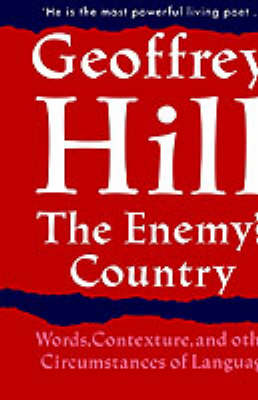Words, Contexture, and Other Circumstances of Language
1 total work
Geoffrey Hill is University Professor at Boston University. He holds an honorary D. Litt. from the University of Leeds and is an Honorary Fellow of both Keble College, Oxford and Emmanuel College, Cambridge. Amongst many other recognitions of his work as a poet, he has received the Hawthornden Prize and the Whitbread Award. He gave the Clark Lectures, on which this book is based, in 1986.
`Well done!' is a familiar cry with a complex sense. It may applaud the merest knack, patronize a decent competence, or squarely recognize something at once finely-achieved and morally just. The language of true valuing is constantly shadowed by parodies of itself - sales-talk, sociable politeness, or gush. The Enemy's Country is concerned with the ways in which judgement is conveyed through language, and with the difficulty of clearing the terms of judgement not from but for the pressures of circumstance so that what is said may be fitting.
Poetry has sometimes been credited with a special place as a form of conduct in language, as if it were a world of words of its own from which the poet masterfully dispenses a distinctly free speech. These essays enquire whether such high praises, even when sincere, are apt to the real conditions of poets' work, to their share of drudgery, their fears of misapprehension or their need to please, to the entanglements of meaning in historical communities. The 'sheer perfection' of lyric utterance is shown to involve a recognition and acceptance of the poet's place in `the scheme of things', a scheme of business and accommodation which is not ideally clean but which remains a ground of the art's refinement.
Dryden is at the centre of the book. Around his exemplary figure, Geoffrey Hill describes with biting erudition and minutely sympathetic imagination the perplexities and felicity of genius in writers such as Donne, Hobbes, and Marvell. The book closes with a study of Pound's `Envoi:1919' in which Hill, characteristically, brings together humour, scrupulousness, and enquiring commitment to the hopes of poetry. The Enemy's Country enacts `virtue's struggle to clear and maintain its own meaning amid the commonplace approximation, the common practice of men'.
`Well done!' is a familiar cry with a complex sense. It may applaud the merest knack, patronize a decent competence, or squarely recognize something at once finely-achieved and morally just. The language of true valuing is constantly shadowed by parodies of itself - sales-talk, sociable politeness, or gush. The Enemy's Country is concerned with the ways in which judgement is conveyed through language, and with the difficulty of clearing the terms of judgement not from but for the pressures of circumstance so that what is said may be fitting.
Poetry has sometimes been credited with a special place as a form of conduct in language, as if it were a world of words of its own from which the poet masterfully dispenses a distinctly free speech. These essays enquire whether such high praises, even when sincere, are apt to the real conditions of poets' work, to their share of drudgery, their fears of misapprehension or their need to please, to the entanglements of meaning in historical communities. The 'sheer perfection' of lyric utterance is shown to involve a recognition and acceptance of the poet's place in `the scheme of things', a scheme of business and accommodation which is not ideally clean but which remains a ground of the art's refinement.
Dryden is at the centre of the book. Around his exemplary figure, Geoffrey Hill describes with biting erudition and minutely sympathetic imagination the perplexities and felicity of genius in writers such as Donne, Hobbes, and Marvell. The book closes with a study of Pound's `Envoi:1919' in which Hill, characteristically, brings together humour, scrupulousness, and enquiring commitment to the hopes of poetry. The Enemy's Country enacts `virtue's struggle to clear and maintain its own meaning amid the commonplace approximation, the common practice of men'.
